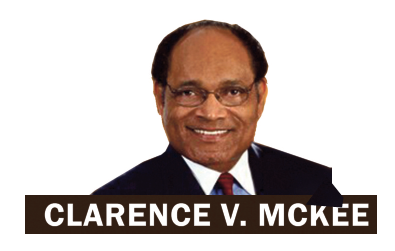What’s wrong with you?” That’s the question being asked of black Republicans who support Donald Trump.
If there is one thing that most white liberals quietly detest it is a black conservative who disagrees with their political viewpoints regarding problems impacting black Americans and the country. As far as they are concerned, it’s fine for blacks to participate in the political process as long as they echo their politics.
They feel vindicated because most black academic, political, media, and civil rights groups hold the same view.
What is particularly revealing is their subconscious racism: they do not hold the same negative views of Trump’s Hispanic and white supporters.
Why would black Republicans turn to Trump?
They just look at the GOP record of promise versus performance and are tired of the “same old same old” from the GOP establishment and its presidential candidates.
For decades the so-called GOP establishment has talked a good game regarding outreach and needing to be “inclusive.”
However, when blacks continually saw few if any black staff or consultants in major positions in much of the Washington GOP establishment — from the Republican National Committee (RNC), to GOP controlled House and Senate Committees down to their state-level counterparts, they took notice.
In the 2008 McCain and 2012 Romney campaigns, the GOP establishment, high paid white advisors and consultants, and many state GOP organizations treated black Republicans like they were non-existent.
They were rarely seen and heard, and some white consultants and staff gave the impression that they regarded blacks like something on the bottom of their shoes.
McCain and Romney lost. Black Republicans took notice.
Then came the 17 contenders in the 2016 presidential campaign. It was more of the same.
But for Jeb Bush, Dr. Ben Carson, Rick Perry, and Donald Trump, one would not know blacks were part of the country.
Even then, except for Carson and Trump, black Republicans did not see anyone who looked like them in meaningful positions or hear references to issues impacting black communities.
Of the surviving Cruz, Kasich, and Trump, only Trump is resonating among many black Republicans because he at least acknowledges blacks and has them in high level campaign positions.
Being from Texas and Ohio respectfully, one would think that Cruz and Kasich would be more racially sensitive.
That’s why so many black Republicans are turning to Trump — they see nothing coming from Cruz or Kasich indicating they even want black support; and, are sick and tired of decades of getting the GOP establishment’s back of the hand.
With that in mind, looking at most of the main stream media, you would never know that Trump has black supporters.
On Saturday, March 12, the weekend before the Ohio primary, black pastor Darrell Scott of New Spirit Revival Center Ministries in Cleveland “brought the house down” when he introduced Donald Trump at an overflow rally.
Among his introductory comments: “The Democratic Party has drifted father and farther away from the traditional values that made our country great . . . the economy is in shambles; our morality is despicable; our streets are not safe; this current administration has had eight years to effect change; Donald Trump is that change agent.”
Did we see this played over and over again on cable and network television as we did the video of a white man punching a black man at a Trump rally?
Except for YouTube, you would not know it happened. Did we see him on cable and network news shows asking why he supported Trump? If so, I missed it. After the Florida primary, the leaders of BlakPAC, dedicated to preparing and electing black conservatives to public office, endorsed Trump.
In addition to its chairman, George Farrell, the endorsement was signed by former Florida Lt. Gov. Jennifer Carroll who outlined Trump’s domestic and military agenda and concluded that BlakPAC was endorsing the best candidate who understood “the needs of our country,” and particularly “minority communities.”
Did this receive much coverage in a time when Clinton, Sanders, and media critics are accusing Trump of race baiting? Not that I noticed.
These were not the first black Trump endorsements.
In January, the National Black Republican Association endorsed Trump, even before the South Carolina and Florida primaries.
Francis Rice, the group’s Chair, said they supported Trump because they were concerned about the impact of illegal immigration on “high black unemployment;” their shared “steadfastly pro-life” values; and, believed that Trump would “free black communities from the destructive grip of socialist Democrats.”
Except for Newsmax, CNN and a few blogs, it received little media attention.
All of that said, it is great that Trump has Dr. Carson on his team.
But if he gets the nomination, blacks who have endorsed him will expect him to continue to utilize — and listen to — black advisers and consultants; conduct a major meaningful outreach campaign for black independents and Democrats; and, utilize black owned media.
That alone would be historic and something the media could not ignore. Clarence V. McKee is president of McKee Communications, Inc., a government, political, and media relations consulting firm in Florida.










No Comment